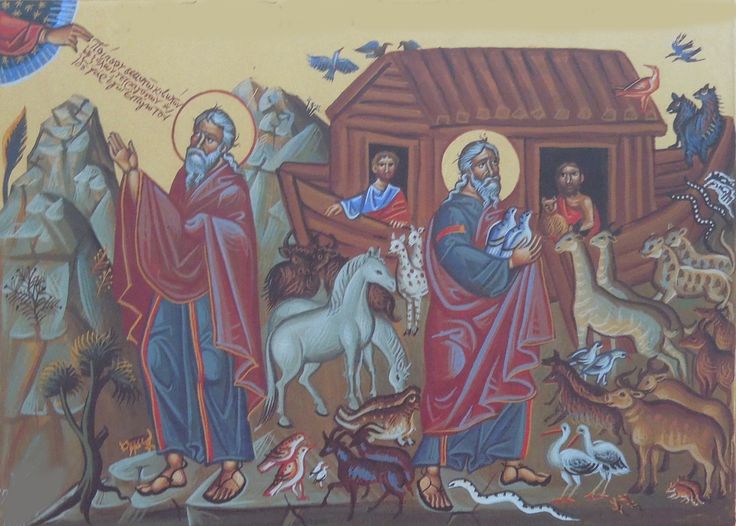You can listen to a podcast of this blog post at
And the Lord God said to Noe, Enter thou and all thy family into the ark, for thee have I seen righteous before me in this generation. And of the clean cattle take in to thee sevens, male and female, and of the unclean cattle pairs male and female. And of clean flying creatures of the sky sevens, male and female, and of all unclean flying creatures pairs, male and female, to maintain seed on all the earth. For yet seven days having passed I bring rain upon the earth forty days and forty nights, and I will blot out every offspring which I have made from the face of all the earth. And Noe did all things whatever the Lord God commanded him. – Genesis 7:1-5
God amplifies His command to Noah to bring the animals into the Ark by adding the command to bring not one but seven pairs of the clean animals, those fit for sacrifice to God. Thus again, as with Abel, He reveals that the true worshippers of the true God have from the beginning practiced sacrifice.
God commands man to sacrifice in order to confess that He is Creator and Lord of all things. God does not need our offering, but rather we need to make it, in order to demonstrate our faith that He is the Creator: as this good thing we are giving up came from His hand, so it returns to Him.
God commands man to sacrifice in order to give thanks to Him. God does not need our offering, but rather we need to make it, in order to demonstrate our gratitude to the One who gave us all that we need, all that we have.
God commands man to sacrifice in order to demonstrate our hope in His providence. God does not need our offering, but we need to make it, in order to acquire the virtue of hope. A true sacrifice comes from our substance, not our surplus. When we sacrifice that which, humanly speaking, we need to survive, we are demonstrating in action our hope in God, our absolute trust that He is true to His promise to care for us. We are asking Him to take care of us, because we cannot take care of ourselves.
God commands man to sacrifice in order to cleanse us of our sins. God does not need our sacrifice, but we need to make it, in order to express true sorrow for our sins in action and not words only. The pain of loss, of letting go that which we value, if this pain is accepted consciously in repentance, cleanses the heart of sin.
God commands man to sacrifice in order to make our lives holy. Sacrifice transforms the stuff of our daily lives, so that our simple human life becomes a priestly liturgy of glory to God, an ongoing sanctification of all that we are. A sacrificial human life is a happy and noble life that reveals what God made us to be.
Unlike our fathers in the Faith, the Old Testament Church, we no longer sacrifice animals to God. But we must sacrifice, because this is inherent in being right with God.
We must sacrifice our time in prayer and good works.
We must sacrifice our pleasures in limiting ourselves by ascetic practice.
We must sacrifice our material substance in tithing for the support of the Church and almsgiving to the less fortunate.
But above all, we must join ourselves to the One Unique Sacrifice which takes away our sins, the Sacrifice of Jesus Christ on the Cross, by participating in the Divine Liturgy and receiving Holy Communion.
The Divine Liturgy is not merely an empty memorial, as the Protestants teach. It is not only a miraculous transformation of the bread and wine into the Body and Blood of Christ that is somehow not a sacrifice, as some modernist Orthodox teach. It is a real Sacrifice, the Sacrifice of Jesus Christ on the Cross, which took place once in history, in a bloody manner, when Our Lord was crucified for us, but in which we participate mystically every time the bloodless sacrifice of the Divine Liturgy is accomplished. At the Anaphora, the Eucharistic Prayer of Consecration, the priest is not simply offering bread and wine to God; this has already been accomplished at the Proskomedia and the Great Entrance (what in the Western Church is called the Offertory). He is offering the ever-slain and risen Jesus, the Lamb of God, to the Holy Trinity, for the forgiveness of our sins and the re-creation of the entire cosmos. Our Lord transforms the bread and wine into His Body and Blood precisely that we sinful men may really offer Him once more, day by day, to God, until the end of the world, for the forgiveness of our sins and the sins of all who believe in Him, and that we may really partake of Him as our Food, until our last breath on earth, for the attainment of eternal life.
How great is this mystery! How great God’s goodness to us!
Who would not want to be an Orthodox Christian?
This commentary was taken from The Eternal Sacrifice: The Genesis Readings for Great Lent by Fr. Steven Allen. You can order a copy from Lulu at http://www.lulu.com/spotlight/FrStevenAllen

